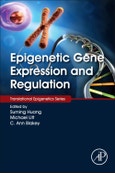The book shows how these heritable mechanisms allow individual cells to establish stable and unique patterns of gene expression that can be passed through cell divisions without DNA mutations, thereby establishing how different heritable patterns of gene regulation control cell differentiation and organogenesis, resulting in a distinct human organism with a variety of differing cellular functions and tissues.
The work begins with basic biology, encompasses methods, cellular and tissue organization, topical issues in epigenetic evolution and environmental epigenesis, and lastly clinical disease discovery and treatment.
Each highly illustrated chapter is organized to briefly summarize current research, provide appropriate pedagogical guidance, pertinent methods, relevant model organisms, and clinical examples.
Please Note: This is an On Demand product, delivery may take up to 11 working days after payment has been received.
Table of Contents
Preface Gary Felsenfeld
1. Introduction and History Suming Huang
2. Histone Modifications Michael Litt
3. Genomic imprinting in mammals memories of generations past Nora Engel
4. Polycomb and trithorax factors in transcriptional and epigenetic regulation Priscilla Nga Ieng Lau and Chi Wai Eric So
5. Chromatin dynamics and genome organization in development and disease Changwang Deng, Bhavita Patel, Yangqiu Li and Suming Huang
6. ncRNA function in chromatin organization Keith E. Giles, Jessica L. Woolnough and Blake Atwood
7. Epigenetic Gene Regulation and Stem Cell Function Aissa Benyoucef and Marjorie Brand
8. Epigenetic Inheritance Benjamin B. Mills, Christine M. McBride and Nicole C. Riddle
9. Transgenerational epigenetic regulation by environmental factors in human diseases Yuanyuan Li
10. Identification of intergenic long non-coding RNA by deep sequencing Gangqing Hu and Keji Zhao
11. Regulation of erythroid cell differentiation by transcription factors, chromatin structure alterations, and noncoding RNA Alex Xiucheng Fan, Mir A. Hossain, Jared Stees, Ekaterina Gavrilova and Jörg Bungert
12. Genetically altered cancer epigenome Ming Tang, Huacheng Luo and Jianrong Lu
13. Long non-coding RNAs and carcinogenesis Félix Recillas-Targa
14. Epigenetics of physiological and premature aging Shrestha Ghosh and Zhongjun Zhou
15. Epigenetic Effects of Environment and Diet Jason O. Brant and Thomas P. Yang
16. Epigenetic control of stress-induced apoptosis Lei Zhou
17. Structure, Regulation, and Function of TET Family Proteins Xin Hu, Yun Chen and Zhizhuang Joe Zhao
18. Epigenetic drugs for cancer therapy Bowen Yan, Xuehui Li, Yurong Yang, Wei Jian and Yi Qiu
19. Epigenetic Mechanisms as Key Regulators in Disease. Clinical Implications and Case Studies Abdelhalim Boukaba, Fabian Sanchis-Gomar, José Luis García-Giménez
Authors
Suming Huang Professor, Department of Pediatrics and PharmacologyDivision of Pediatric Hematology/Oncology
Director, Four Diamonds Endowed Epigenetics Research Program
Pennsylvania State University College of Medicine
500 University Dr., H085
Hershey, PA 17033. Michael D. Litt Associate Professor of Medical Education Genetics, Ball State University. Cynthia Ann Blakey Associate Professor, Department of Biology, Ball State University.








